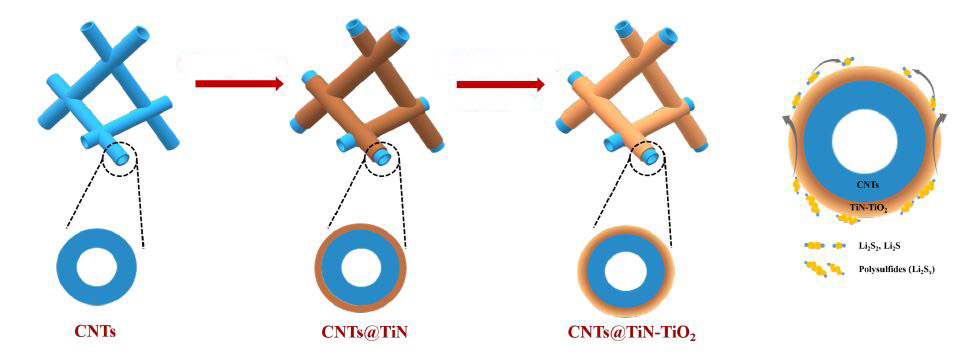From pv magazine International
One of the main issues with lithium-sulfur (Li-S) batteries is that they cannot be recharged enough times to make them commercially viable. This is due to the formation of lithium polysulfides during the fabrication process and is the reason for the rapid deterioration of their capacity.
Scientists from the Okinawa Institute of Science and Technology Graduate University (OIST) in Japan claim to have overcome this issue by using two new materials – titanium oxide (TiO2) and titanium nitride (TiN).
During the fabrication of a lithium-sulfur battery, the lithium always reacts with sulfur, they said, noting that initially this combination produces lithium polysulfide, which can easily dissolve into polysulfides and negatively affect device performance. To improve the batteries, the lithium polysulfide should immediately begin to transform the final product into either lithium sulfide (Li2S) or lithium persulfide (Li2S2).
In the new battery configuration, the use of TiO2 is designed to absorb undesired polysulfides, while the TiN accelerates the absorption process. The scientists developed the best-performing battery by coating a carbon nanotube framework (CNT) with 10 nm of TiN and 5 nm of TiO2 and adopting an annealing post-treatment, which resulted in a uniform TiN-TiO2 heterostructure with high catalytic ability.
“The corresponding lithium-sulfur battery shows enhanced electrochemical performance with high specific capacity of 1289 mAh g−1 at 1 C and capacity retention of 85% after 500 cycles at 2 C,” the Japanese scientists stated.
This performance translates into shorter charging times, longer life between charges, and greater overall lifespans, they claimed. They described their battery and the related manufacturing process in “Long-life lithium-sulfur batteries with high areal capacity based on coaxial CNTs@TiN-TiO2 sponge,” which was recently published in Nature Communications.
The University of Maryland and the Argonne National Laboratory have also recently conducted research on the polysulfide issue for sulfur-lithium batteries.
This content is protected by copyright and may not be reused. If you want to cooperate with us and would like to reuse some of our content, please contact: editors@pv-magazine.com.









By submitting this form you agree to pv magazine using your data for the purposes of publishing your comment.
Your personal data will only be disclosed or otherwise transmitted to third parties for the purposes of spam filtering or if this is necessary for technical maintenance of the website. Any other transfer to third parties will not take place unless this is justified on the basis of applicable data protection regulations or if pv magazine is legally obliged to do so.
You may revoke this consent at any time with effect for the future, in which case your personal data will be deleted immediately. Otherwise, your data will be deleted if pv magazine has processed your request or the purpose of data storage is fulfilled.
Further information on data privacy can be found in our Data Protection Policy.